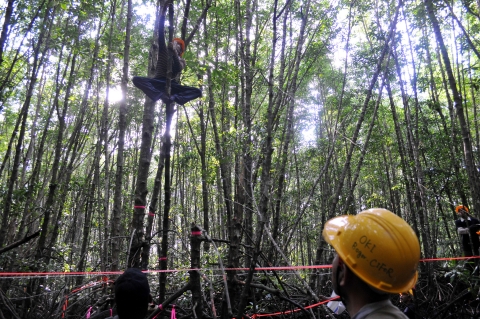
New report on informing the public through better environmental reporting
The Center for International Media Assistance (CIMA)’s latest report, which shows how media development organizations are jumping in to improve environmental reporting, features ICFJ Knight projects such as Oxpeckers, Geojournalism Handbook, InfoAmazonia, African skyCAM and more.
News game in Argentina: Which presidential candidate is best for you?
With the presidential election around the corner, Argentine voters now have a new way to decide which candidate to support. Interactive app Yo Quiero Saber (I Want to Know), a winner of ICFJ Knight Fellow Mariano Blejman’s HacksLabs, lets users know what they have in common with presidential candidates of different parties. Read more about the game in Política Argentina (in Spanish).
Shedding light on medical malpractice in Peru's private sector
Investigative journalism outlet OjoPúblico (Public Eye), also a HackLabs winner, developed Cuidados Intensivos (Intensive Care), an app that helps Peruvians report medical abuse or malpractice in private health services. Cuidados Intensivos is the first journalistic application of its kind in Peru. Read more about the tool in El Universal’s article (in Spanish).
An insider’s look into Media Factory bootcamps
Blejman holds media bootcamps across Latin America through the Media Factory News Accelerator. To get an idea of what the hackers and journalists are up to, you can check out this Storify of the São Paulo bootcamp. Upcoming bootcamps will be held in Mexico on August 1 and Bogotá on August 3. Click here for more information.
You've been quoted in my #Storify story "Media Bootcamps at Sao Paulo #mediafactory" http://t.co/CwX3MXx9xd
— Mariano Blejman (@blejman) July 27, 2015
Want to learn more about data journalism?
Code for South Africa, launched with seed funding through ICFJ Knight Fellow Justin Arenstein’s 2012 African News Innovation Challenge, is running a Winter School for working journalists who want to learn the art of data-driven storytelling. The Winter School is a way to break through the hot buzzword and teach people how to actually practice data journalism in the newsroom. The Winter School's workshop will be held August 17-19 in Cape Town, South Africa, followed by three weeks of mentoring. Find out more about registration and the event here.
A free API that provides localized information for maps in South Africa
The U.K.-based mySociety’s MapIt, a technology that powers maps used in Code for South Africa’s Wazimap project, offers a free API that anyone can use to identify users and localize data around them. Code for South Africa tapped into the API to create a South African version that provides localized information and draws South African maps in websites. Read more about MapIt’s utility in this blog post.
What else the fellows have been up to:
- Code for South Africa helped launch Open Data Durban, which drives social change through tech and data in the South African city.
- HacksLabs blogger Federico Ricciardi described HackLabs grantee Cargografías’s open-source database platform in this blog post (in Spanish).
- African Network of Centers for Investigative Reporting (ANCIR) is inviting applicants to apply for grants to investigate gold mining in West African countries.
This post is also published on IJNet, which is produced by ICFJ.
Main image CC-licensed via Flickr by CIFOR.